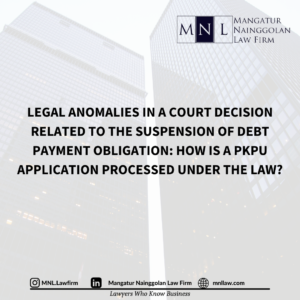
One of the state-owned enterprises (BUMN) has been placed under a Temporary Court-Supervised Debt Payment Obligation (PKPU) status by a decision of a Commercial Court in Makassar. The PKPU was initiated by a civil law entity in the form of a limited partnership (CV). In its decision, the court opined that the PKPU application filed by the CV met both formal and substantive requirements, as stipulated in Article 222, paragraph 3 of the Republic of Indonesia Law Number 37 of 2004 concerning Bankruptcy and Suspension of Debt Payment Obligations (PKPU Law).
However, there was a dissenting opinion from one of the judges who rejected the PKPU application, arguing that the CV lacked legal standing to file a PKPU application against a state-owned enterprise and had erroneously filed the application with the Commercial Court, which was not in accordance with the legal status of the BUMN. Given the contradiction in the court’s reasoning, it is necessary to first understand the process of filing a PKPU application based on the provisions of the PKPU Law.
According to the principle of lex specialis derogat legi generali, the procedural law governing bankruptcy and PKPU cases is specifically regulated by the PKPU Law. Chapter III of the PKPU Law provides guidance on how the PKPU process unfolds. Article 22 of the PKPU Law stipulates that a PKPU application can be submitted by a Debtor who has more than one Creditor or by Creditors. The PKPU application must be submitted to the court and signed by the applicant and their attorney. If the Debtor is a Bank, Securities Company, Stock Exchange, Clearing and Loan Institution, Settlement and Custody Institution, Insurance Company, Reinsurance Company, Pension Fund, or a state-owned enterprise engaged in the public interest, then the Ministry of Finance is eligible to file a PKPU application.
In relation to the Commercial Court’s decision regarding the state-owned enterprise, one of the judges argued that the PKPU application by the CV should be rejected because it did not meet the requirements of the PKPU Law. According to this judge, the Ministry of Finance should have been the one to file the PKPU application against the BUMN in question. Therefore, in the view of this judge, the CV did not have the right to file a PKPU application against the BUMN.
Furthermore, based on the articles of association of the BUMN in question, it is headquartered in Jakarta. However, the PKPU application was filed in Makassar. Referring to Article 224(1) of the PKPU Law, a PKPU application must be submitted to the court as specified in Article 3. According to Article 3, paragraph 5 of the PKPU Law, if the Debtor is a legal entity, its legal domicile is as specified in its articles of association. Additionally, as established by Presidential Decree No. 97 of 1999, the jurisdiction of Commercial Courts is divided into regions, one of which is the Commercial Court at the Central Jakarta District Court, covering the areas of DKI Jakarta, West Java, Banten, South Sumatra, Lampung, and West Kalimantan.
In light of the Commercial Court’s decision regarding the BUMN, according to one of the judges, the PKPU application by the CV should have been filed with the Commercial Court at the Central Jakarta District Court. Therefore, the PKPU application by the CV should have been rejected.
Based on the above explanation, there are several aspects that the panel of judges needs to consider in the CV’s PKPU application. The panel of judges should pay closer attention to the formal requirements in the PKPU application filed by the CV, particularly concerning whether the BUMN in question operates in the public interest or not. Therefore, in this case, the legal status of the CV as the applicant needs to be further examined. Furthermore, the panel of judges should also take into account the relative jurisdiction of the relevant commercial court. It is evident from the articles of association presented in the proceedings that the legal domicile of the BUMN does not fall within the jurisdiction of the Commercial Court at the Makassar District Court. Therefore, it is clear that a legal anomaly has occurred in the reasoning of the panel of judges who accepted the PKPU application from the CV.
